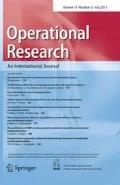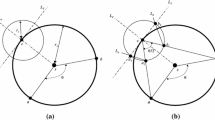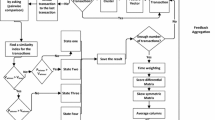Abstract
Reputation systems are very important in e-markets, where they help buyers to decide whether to purchase a product. Since a higher reputation often represents higher profit, malicious users may try to deceive them to increase their reputation. This may be aggravated through fear of retaliation to bad ratings or collusion of multiple users so that they can perform a fraud of high value before being denounced by their victims. In this paper we provide a new reputation management system (RMS) which prevents retaliation and minimizes fake ratings due to collusion. Furthermore, it combines the price and the sales track record of the seller with the charges he has already paid to the system. In this way, it becomes too expensive both in terms of time and money for the malicious users who may collude to launch an organized attack discrediting an e-commerce platform. We test our proposals with several simulation scenarios, verifying the validity of our claims.





Similar content being viewed by others
References
Alpcan T, Örencik C, Levi A, Savas E (2010) A game theoretic model for digital identity and trust in online communities. In: Proceedings of the 5th ACM symposium on information, computer and communication security (ASIACCS ‘10). pp 341–344
Amazon (2010) http://www.amazon.co.uk. Accessed Aug 2010
Artz D, Gil Y (2007) A survey of trust in computer science and the semantic web. J Web Semant, Elsevier: 58–71
Chang J, Wong H (2010) Selecting appropriate sellers in online auctions through a multi-attribute reputation calculation method. Electronic Commerce Res Appl, Elsevier. doi: 10.1016/j.elerap.2010.05.003
Chen X, Zhao K, Chu X (2008) SepRep: a novel reputation evaluation model in peer-to-peer networks. ATC, Springer-Verlag LNCS 5060: 86–99
Cormier C, Tran T (2009) Improving trust and reputation modeling in e-commerce using agent lifetime and transaction count. MCETECH 2009, Springer-Verlag LNBIP 26: 184–195
Dong P, Wang H, Zhang H (2009). Probability-based trust management model for distributed e-commerce. In: Proceedings of the IC-NIDC’09. pp 419–423
Du R, Ma X, Wang Z (2009) E-commerce trust model based on perceived risk. In: Proceedings of the second symposium international computer science and computational technology (ISCSCT ‘09). pp 175–178
eBay (2010) http://www.amazon.com. Accessed Aug 2010
Feigenbaum J, Parkes D, Pennock D (2009) Economic and social sciences will drive the internet protocols and services into the future. Commun ACM 52(1):70–74
Gudes E, Gal-Oz N, Grubshtein A (2009) Methods for computing trust and reputation while preserving privacy. In: Gudes E, Vaidya J (eds), Data and applications security, IFIP LNCS 5645, pp 291–298
Gutowska A, Sloane A (2010) Modelling the B2C marketplace: evaluation of a reputation metric for e-commerce. WEBIST 2009, Springer-Verlag, LNBIP 45: 212–226
Hughes J, Lang K, Vragov R (2008) An analytical framework for evaluating peer-to-peer business models. Electron Commer Res Appl 7:105–118
Jøsang A, Ismail R, Boyd C (2007) A survey of trust and reputation systems for online service provision. Decis Support Syst 43(2):618–644
Kamvar S, Schlosser M, Garcia-Molina H (2003). The eigentrust algorithm for reputation management in p2p networks. In: 12th international conference on world wide web. pp 640–651
Lenzini G, van Houten Y, Huijsen W, Melenhorst M (2010) Shall I trust a recommendation? towards an evaluation of the trustworthiness of recommender sites. Springer-Verlag, LNCS 5968: 121–128
Li J, Liu L, Xu J (2010) A P2P e-commerce reputation model based on fuzzy logic. In: Proceedings of the 10th IEEE international conference on computer and information technology (CIT 2010): 1275–1279
Malik Z, Bouguettaya A (2009) Reputation bootstrapping for trust establishment among web services. IEEE Internet Comput January/February: 40–47
Maranzato R, Pereira A, Neubert M, do Lago A (2010) Fraud detection in reputation systems in e-markets using logistic regression and stepwise optimization. ACM SIGAPP Appl Comput Rev 11(1):14–26
Marmol F, Perez G (2010) State of the art in trust and reputation models in P2P networks. In: X Shen et al. (ed) Handbook of peer-to-peer networking, Springer Science + Business Media, LLC
Remondino M, Boella G (2010) How users’ participation affects reputation management systems: the case of P2P networks. Simul Model Pract Theory 18:1493–1505
Sundaresan N (2007) Online trust and reputation systems. In: Proceedings of the 8th ACM conference on electronic commerce. pp 366–367
Tang L (2009) Grouping-based mechanism driven by reputation in P2P E-commerce. In: Proceedings of the 2009 international symposium on web information systems and applications (WISA ‘09). pp 510–515
Wang Y, Lin K (2008) Reputation-oriented trustworthy computing in e-commerce environments. IEEE Internet Comput July/August: 55–59
Wang Y, Vassileva J (2007) Toward trust and reputation based web service selection: a survey. Int Trans Syst Sci Appl 3(2):118–132
Wang Y, Wong D, Lin K, Varadharajan V (2008) Evaluating transaction trust and risk levels in peer-to-peer e-commerce environments. ISeB 6:25–48
Wu M (2010) Cloud trust model in e-commerce. In: Proceedings of the second international symposium on networking and network security (ISNNS ‘10). pp 271–274
Wu F, Li H, Kuo Y (2010) Reputation evaluation for choosing a trustworthy counterparty in C2C e-commerce. Electron Commer Res Appl, Elsevier. doi:10.1016/j.elerap.2010.09.004
Author information
Authors and Affiliations
Corresponding author
Rights and permissions
About this article
Cite this article
Fouliras, P. A novel reputation-based model for e-commerce. Oper Res Int J 13, 113–138 (2013). https://doi.org/10.1007/s12351-011-0114-6
Received:
Revised:
Accepted:
Published:
Issue Date:
DOI: https://doi.org/10.1007/s12351-011-0114-6




